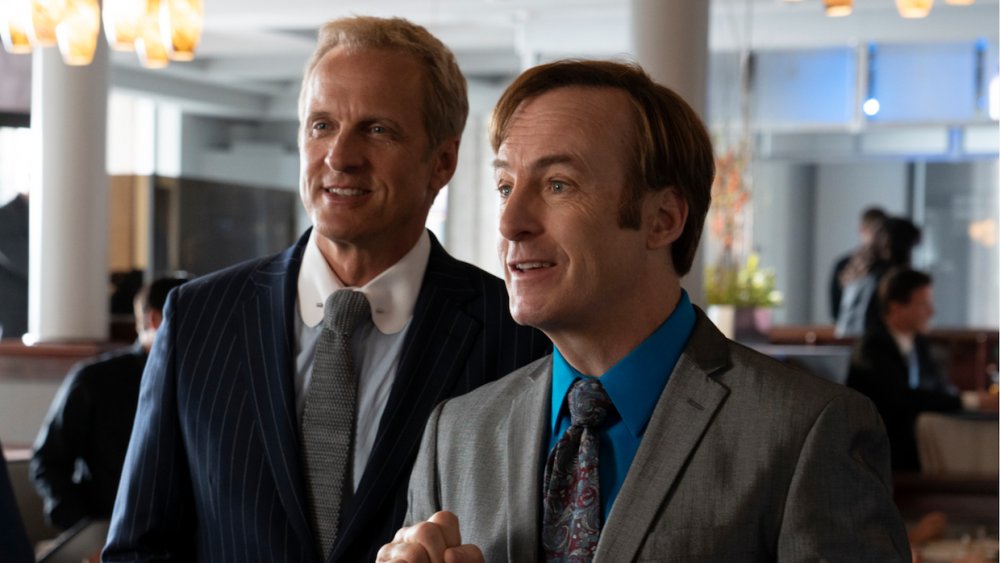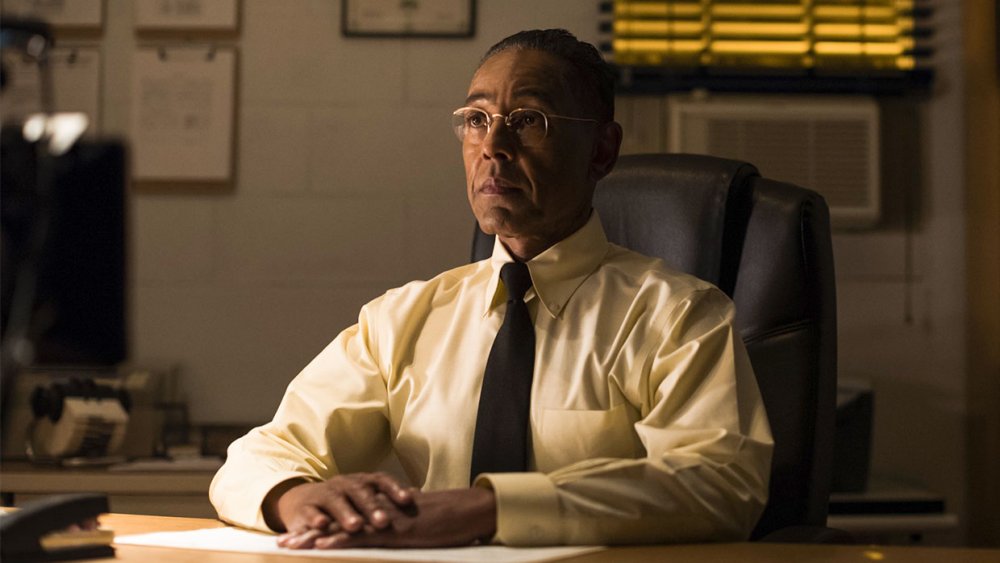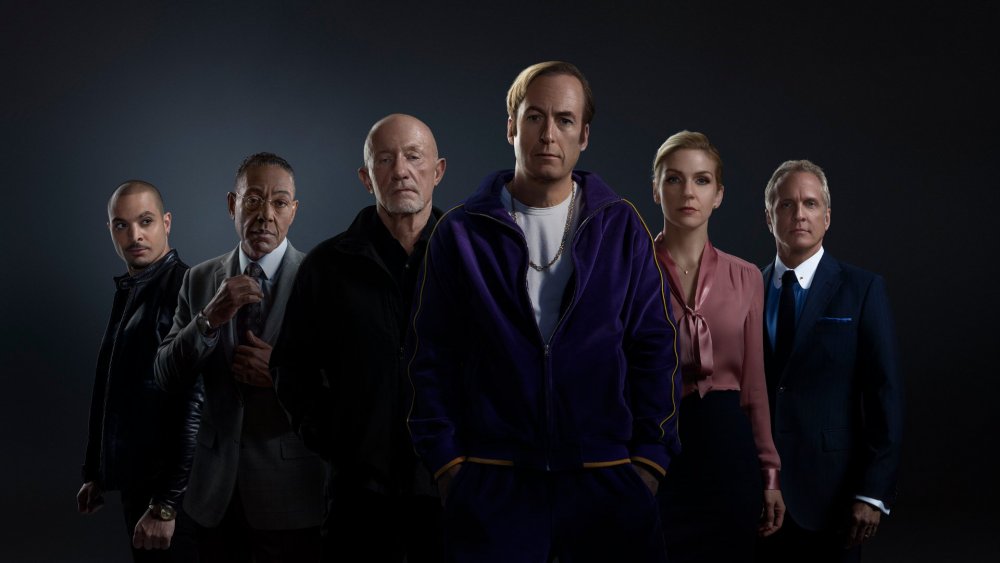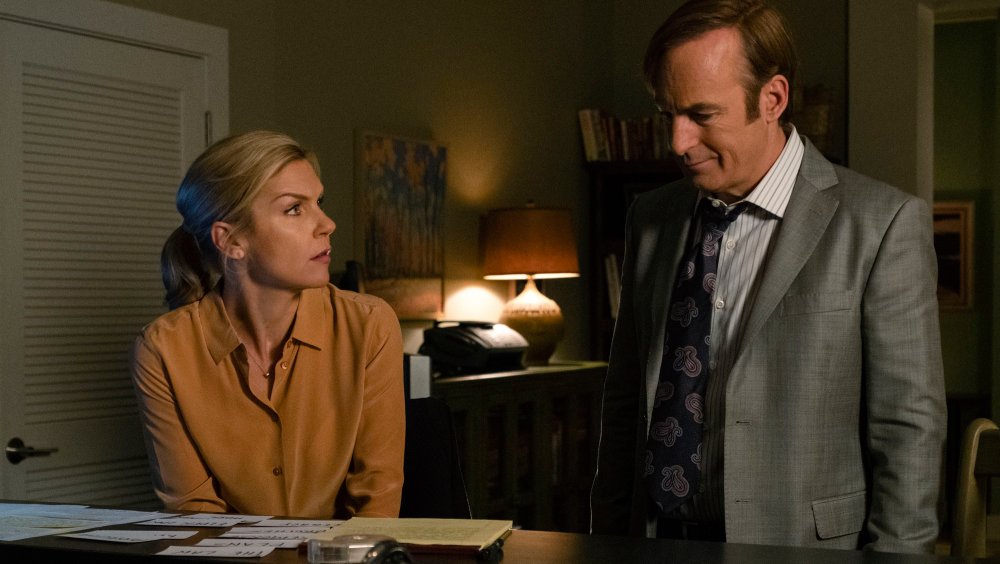The Real Reason Better Call Saul Is Ending
The sixth season of Better Call Saul, which is due sometime in 2021, will be its last. As with the conclusion of its parent show, Breaking Bad, there is much to mourn in saying goodbye to Jimmy McGill and his troupe of semi-malignant personalities. We do indeed like to watch these people gloriously break bad, all while appreciating the complexities of their humanity. It's been a wonderfully excruciating slow slide watching Jimmy make the transition from bumbling, somewhat-well-meaning con artist to full-fledged capital-C Criminal, but the ouroboros of Jimmy's life in this prequel series must close; since the end of season 5 takes place in mid-2004 and Breaking Bad begins in 2008, there isn't much further to go.
All journeys have endings, and as a prequel, Better Call Saul's is more pre-determined than most. That's the simple answer as to why its creators are wrapping it all up, and any longtime fan of both series naturally realizes that. But despite knowing where Jimmy ends up as a result of Breaking Bad, there's still questions as to what his actual ending looks like, and whether we can expect any more stories out of the ensemble surrounding Walt and Jimmy's fates. Both series operate on almost mythological scale with their morally grey protagonists, leading them through tribulations rife with cheating, lying, and occasionally even murder. We watch the bad karma stack up with glee, but will Jimmy suffer the same damning fate as Walt for it?
Better Call Saul's ending was pretty much the plan all along
Giancarlo Esposito, who portrays meth king Gus Fring on both shows, let the cat out of the bag a little early back in April of 2019 when he told The Hollywood Reporter that six seasons was basically the plan. He'd certainly be in a place to know, since his position within Better Call Saul has become more important as the story closes in on the "contemporary" era of Breaking Bad. AMC walked the idea back a little in a response after the article was published, stating that they didn't have "an endgame" yet, but that does appear to be how it panned out nonetheless.
It's almost certainly true that there was no specific plot line locked in, to say nothing of finished scripts, but creators Vince Gilligan and Peter Gould likely understood by that time where the edges of the ballpark were for the series. It also creates a nice bit of symmetry — both series will have just over 60 episodes when all is said and done. After all, the thing about a prequel is that it must eventually join its source material, which becomes the true ending.
A pre-established ending still invites questions
A significant portion of the tension in Better Call Saul comes from knowing — admittedly, only to a certain extent — how the story ends. We all know Saul will meet Walt, and that everything will eventually fall apart. The prequel series is the tragicomedy revealing that it wasn't always this way, that it was possible (maybe) for Jimmy to be and do something else. Part of the experience in watching Better Call Saul can mean rooting for this person who has clearly been set back by the people he should have been able to count on (particularly his brother), however, Jimmy himself isn't that great either, and has been given real opportunities to reform. Still, Breaking Bad is the end result.
Of course, we don't know for sure yet what Jimmy will choose to do now that his cover identity has definitely been blown as of season five — but in a general sense, we already do. Nobody got "out" in Breaking Bad. They either died or at the very least departed the show with the potential for substantial prison time hanging over them. The critical exception is Jesse, as we see in El Camino, but even then we don't know what the rest of that life looks like for him. He's still a recovering meth addict, he still only has a high school education, he's still deeply traumatized from working with Walt. He may be "out," but like Jimmy, that will always be tenuous. Jesse, however, grew into a position of sympathy over the course of the show. Walt took advantage of an addict to pursue his own greed, and there was never much chance of Jesse getting out unscathed. What does Jimmy deserve, compared to Jesse and Walt, come the end of his narrative?
Another prequel? Another sequel?
Ending a wildly popular series naturally raises questions about whether there will be anything more, new, or different. The short answer in this case? Probably not. Vince Gilligan told The Hollywood Reporter that this universe is not one he's looking to revisiting any time soon: "I always [add the] caveat of 'never say never,' but you don't want to drive it into the ground, so I would say at this moment in time, probably not." He's still under a contract with Breaking Bad and Better Call Saul studio Sony Pictures TV, but that is to develop projects in general, not necessarily for anything related to the Breaking Bad universe.
If Gilligan isn't interested in making more, he certainly shouldn't — no good TV comes from being put under duress to produce. There isn't really any need to, either. Telling Jimmy's story has filled out a lot of background for other characters who have been featured on both series, like Gus and Mike. Giancarlo Esposito is pretty busy these days, anyway. Giving them their own series or tie-in movies begins to encroach on, to quote Gilligan, "driving it into the ground" territory. Fans love lore, but there is such a thing as overexplaining a fictional world. Jesse deserved a coda, and Jimmy was interesting enough to reveal his past, because his story is a different kind of descent from Walt's. Both series will always be there for us when we need to scratch that bad-men-doing-bad-things itch.



